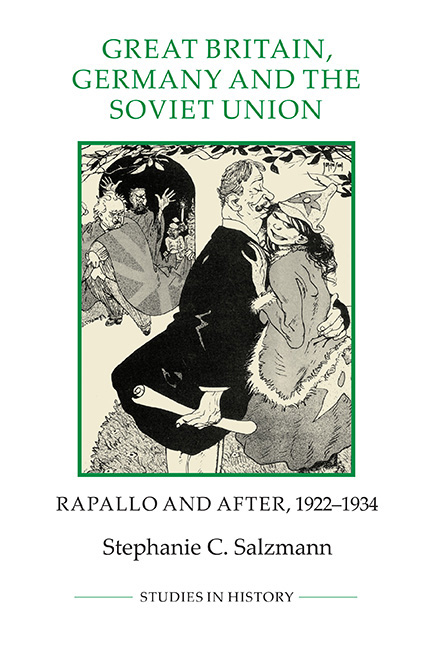Book contents
- Frontmatter
- Contents
- Acknowledgements
- Abbreviations
- Introduction
- 1 ‘It Nearly Overthrew the Applecart’: Lloyd George and the Treaty of Rapallo
- 2 ‘The Most Important Event Since the Armistice’: The Foreign Office and Rapallo
- 3 Rapallo's First Test: The Ruhr Crisis
- 4 The Policy of Conciliation: Rapallo and the First Labour Government
- 5 The Battle for the German Soul: Locarno and the Treaty of Berlin
- 6 Rapallo and the Rupture of Anglo-Soviet Relations
- 7 Rapallo and the Decline of the Locarno Spirit
- 8 An Economic Rapallo?
- 9 Rapallo and the Disarmament Conference
- 10 The Rapallo Relationship and Hitler's Rise to Power
- 11 The End of Rapallo: The German–Polish Non-Aggression Treaty
- Conclusion
- Bibliography
- Index
5 - The Battle for the German Soul: Locarno and the Treaty of Berlin
Published online by Cambridge University Press: 29 April 2017
- Frontmatter
- Contents
- Acknowledgements
- Abbreviations
- Introduction
- 1 ‘It Nearly Overthrew the Applecart’: Lloyd George and the Treaty of Rapallo
- 2 ‘The Most Important Event Since the Armistice’: The Foreign Office and Rapallo
- 3 Rapallo's First Test: The Ruhr Crisis
- 4 The Policy of Conciliation: Rapallo and the First Labour Government
- 5 The Battle for the German Soul: Locarno and the Treaty of Berlin
- 6 Rapallo and the Rupture of Anglo-Soviet Relations
- 7 Rapallo and the Decline of the Locarno Spirit
- 8 An Economic Rapallo?
- 9 Rapallo and the Disarmament Conference
- 10 The Rapallo Relationship and Hitler's Rise to Power
- 11 The End of Rapallo: The German–Polish Non-Aggression Treaty
- Conclusion
- Bibliography
- Index
Summary
Following from secretary of state for Sir W. Tyrrell. Cock-a-doodle-do!
The joy was overwhelming. Months of tiresome negotiations lay behind Austen Chamberlain and his colleagues back in London, months during which the foreign secretary more than once was about to despair, either about the French, or more often about the German attitude. But patience and skilful negotiations eventually won the day. With the Locarno treaty now signed, the issue of security, the touchstone of European relations since 1919, had leaped forward a great deal. It was the breakthrough towards more amicable relations between the victors and the vanquished of the First World War, and shifted Germany's eastern orientation to a more western outlook.
By signing the treaty of Locarno, the European powers admitted that as long as they had not agreed on a set of mutually accepted principles to define ‘security’ a lasting peace was impossible. Given the significantly diverging national interests of the key countries, France, Germany and Great Britain, this task had not been easy. Britain often found herself sitting between all chairs because she categorically declined to give security guarantees to any single power, as this exposed her to the danger of being dragged into yet another European quarrel.
Security was the most debated issue in the mid-1920s. When the second Baldwin government took over from Labour in November 1924, it inherited from its predecessors a renewed debate on security. Ramsey MacDonald, the outgoing prime minister, and his French counterpart, Edouard Herriot, had recognised that European pacification remained illusory as long as Franco-German antagonism prevailed. The fruit of their deliberations was the Geneva ‘Protocol for the pacific settlement of international disputes’ of 2 October 1924, which intended to turn the League of Nations into an effective instrument for the preservation of peace. The reparation settlement under the Dawes plan, and negotiations for the Franco-Belgian withdrawal from the Ruhr area in the summer of 1924 had marked the first steps towards removing sources of friction, in this instance by forcing Paris rather than Berlin into retreat. The Geneva protocol was therefore the tacit British acknowledgement that to some extent French demands now had to be met.
- Type
- Chapter
- Information
- Great Britain, Germany and the Soviet UnionRapallo and after, 1922-1934, pp. 55 - 76Publisher: Boydell & BrewerPrint publication year: 2002



